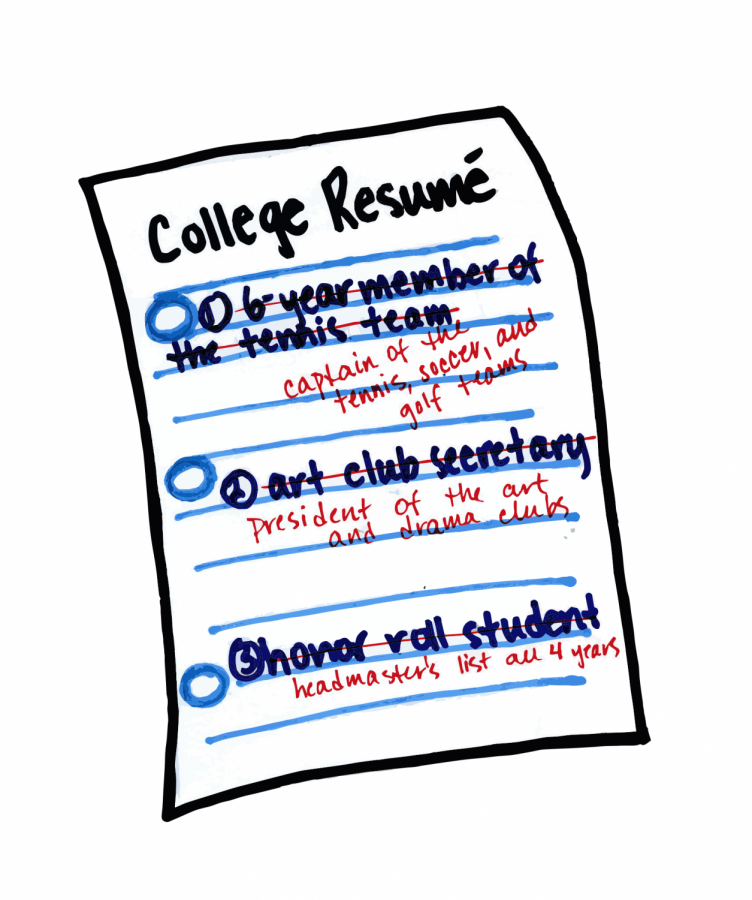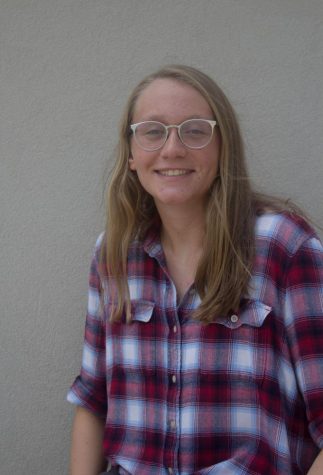“Put your best foot forward.”
We hear this phrase all the time—for job interviews, presentations and the dreaded college process. However, there is a thin line between presenting yourself in a favorable light and flat-out lying about yourself in hopes of getting that job, that good grade or that college acceptance.
Many people advise seniors not to be too personal or revealing in their applications. One consensus is that college admissions officers don’t want to hear about your strange obsessions or your struggles with mental illness.
Writing college essays is unique because you’re writing personal essays, but you still want to present your best self.
“You’re simultaneously giving insight into who you are and what you value, but you still don’t know anything about the person reading your essays.” Co-Director of College Counseling Stephanie Dryden said. “You have to have a sense of integrity in the process, but you don’t have to bear your whole soul.”
While this kind of advice makes sense, it can also put us in a strange position. What if “putting your best foot forward” feels disingenuous? What if presenting yourself in the most favorable light makes you feel like you’re giving up some of your personal integrity?
“The question of marketing yourself versus being honest is probably one of the most crucial aspects of the process,” senior Charlie Tang said. “It informs the essays especially—is your intent to be impressive or sincere?”
The concept of “self-marketing” in the college process takes on a different meaning for each person. When applying to college, it is natural to want to present the best version of oneself. Would you show up to an interview in sweatpants and talk about how you watched two seasons of a TV show over the weekend? Of course not—you would probably dress up and try to focus the conversation on your accomplishments in order to impress your interviewer.
“I think it’s a lot like Snapchat,” Tang said. “You want to show off your best angles.”
Senior Daniel Jahren agrees.
“Never self-deprecate, especially in interviews,” Jahren said. “Treat them like conversations. Be honest in your applications, but be confident. Don’t leave out anything, no matter how insignificant you think it is.”
However, when we start to make important life decisions in order to look more impressive to colleges, things can get morally ambiguous. Many Trinity students join extracurriculars as underclassmen–not because they are genuinely interested, but because they heard that participating in those activities would look appealing to colleges.
Admissions officers often see through these ploys.
“I think sometimes this can come through in the essays, and you can also tell in terms of descriptions of activities whether somebody is really interested or not,” Dryden said.
Similarly, many students feel pressure to take classes that they don’t like, even at the advanced placement level, because it will “look better” on a college transcript. Not only is it horrible to have to slog through work for a hard class that you’re not interested in, but when most of the students aren’t interested in the material, it takes the joy out of the class for those who genuinely want to learn the material.
This application-centric decision-making process often becomes counterintuitive because it keeps students from spending their time doing things that they are passionate about. If students spend time doing activities for the sole purpose of getting into college, once they get there, they may not be sure what they like or want to do.
In extreme examples, students feel that taking classes and participating in activities that cater to college admissions still aren’t enough. Some students pay others to write their essays for them, and others turn to independent organizations that can charge up to thousands of dollars for out-of-school essay help and additional counseling. Online companies such as IvySelect.com offer services such as “true college essay specialists with a honed professional understanding that is way beyond essay coaching and writing services.” With their help, these services assure clients that by “utilizing our experience, knowledge base and deep-level strategies, your writing will be top flight, unique and will stand head and shoulders above your competition.”
While getting help in this way seems attractive to many stressed out college applicants, it may become counterintuitive when the student in question actually goes to college.
If the persona that is presented in a college application does not match the person who filled out that application, then the college is either admitting or denying someone that does not actually exist. If a student is admitted based on a faulty persona, his or her actual personality may not be a good fit for the college. What is the point of attending a prestigious university if a student drowns in the workload and is miserable?
“If you are fake on your college application, then colleges may admit or deny you based on things that do not really describe you,” senior Arrington Moses said. “If you want to go to a college that is a good fit, I think you should be as honest as possible.”
That being said, falling into the trap of being dishonest on college applications is easy and often inevitable, especially if you feel that everyone else around you is doing it. How are you supposed to compete with other applicants who had spent much of their high school lives gearing up for college?
“I used more truth than marketing in my applications, and I haven’t gotten in anywhere yet,” senior John Leonard said.
Furthermore, even if a student makes an effort to be honest in his or her applications, there are some questions on applications that students feel require a lie.
“I don’t feel like I was dishonest in any aspect of my applications, but it was difficult applying to schools where I had to select a major or college to apply into when I didn’t know what I wanted to do yet,” senior Teagan Hosbein said. “I guess I bluffed with that.”
Still, a surprising amount of Trinity students feel that though a bit of marketing is a positive thing, changing yourself or lying on applications is detrimental not only for you, but for other applicants as well.
“While I think it’s perfectly okay to use words that are extremely niche in order to make yourself look much better for applications, I do think that it is imperative that one does not lie when they are doing apps,” senior Colt Holler said. “If lying becomes rampant on applications, they would cease to serve any purpose at all.”
As senior Samantha DiMaio said, the majority of Trinity students are already impressive, high-achieving applicants.
Senior Amelia Chan agrees.
“You’re way more impressive than you think—you don’t have to advertise yourself,” Chan said.
DiMaio felt that tackling tough, personal topics in her essays set her applications apart.
“I want schools to know what encompasses me as a person and I don’t want to mislead them,” DiMaio said. “I applied with the mindset that if you’re genuinely passionate enough about something, then you’ll make an impact.”
Tang agrees.
“I wish I knew this before I began the process,” Tang said. “When all you are to an admissions reader is essentially a bunch of numbers attached to two letters of unknown enthusiasm, the essays are critical in distinguishing yourself, and what distinguishes any writer is their unfiltered voice. Of course, there are—and should be—limits to this sincerity, but on the whole, I think it’ll get you much farther than trying to don a fake persona.”
Coming from a prep school background, we tend to place too much value on where we go to college and perhaps not enough value on what we do when we get there.
“No matter where you end up going to school, if you keep an open mind and allow yourself to step out of your comfort zone, everything will be fine,” Trinity alum Nick Smith said. “I think a lot of kids chalk up how great their college experience will be to perceived college rankings and statistics, but as soon as you can look past all the numbers, your college experience will be almost solely dependent on what you choose to make of it.”
Smith, currently a sophomore at Cornell University, hadn’t even considered going to Cornell until mid-December of his senior year. He’d applied early decision elsewhere and was rejected, left with two weeks to rush out as many applications as he could before most colleges’ regular decision deadlines.
“Cornell became my top choice almost purely on the basis of their wanting to have me,” Smith said.
However, he has no regrets about his college process.
“I believe now that the series of events (mostly rejections) that led me to Cornell was absolutely in my best interest,” Smith said. “I’ve seen myself and my interests grow in ways I could have never imagined. The breath of my perspective and comfort have been stretched beyond their limits repeatedly and I’ve made some of the closest friends I’ve ever had in my time here.”
In his book “Where You Go is Not Who You’ll Be: An Antidote to the College Admissions Mania,” Frank Bruni writes, “Where we go to college will have infinitely less bearing on our fulfillment in life than so much else: the wisdom with which we inhabit; our generosity toward the families we inherit and the families that we make.”
The bottom line is that where we go to college has a much smaller impact on our future happiness than we think.
“There’s so much more than what college you get into,” Tang said.




